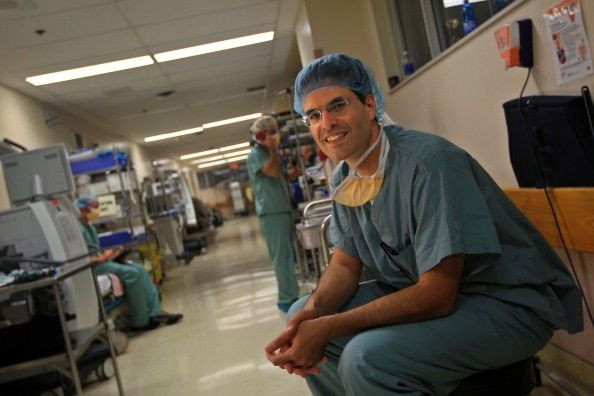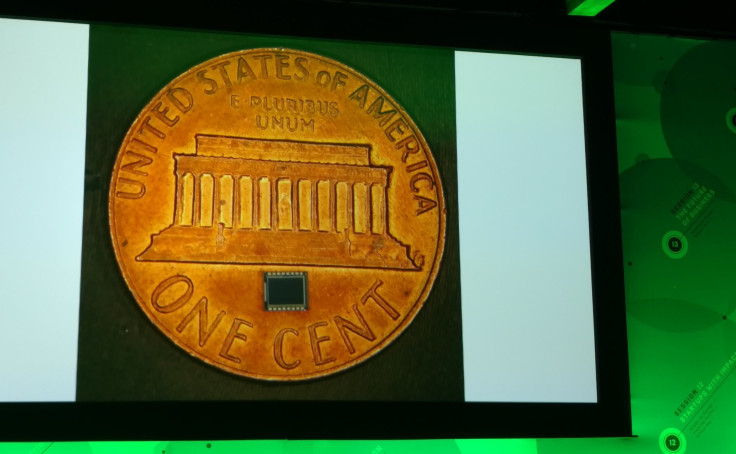Meet The Man Who Invented Tech To Cure His Inoperable Brain Tumor

LONDON -- When Avi Yaron found out he had an inoperable brain tumor, he didn't take it lying down. Rather than accept that his life was over, he invented the technology that saved his life and is now saving the lives of thousands of others around the world.
Back in 1993, when he was 26 years old, Yaron was living what he calls an "intensive life" as an Israeli student who was also running two startups. He was sleeping for only two or three hours a night but says he had the Midas touch, succeeding in everything he was doing. "I was high on life. Everything was great."
Then, riding his motorbike from Tel Aviv University to one of his startups, he had an accident, was rushed to a hospital and had a CT scan that uncovered a brain tumor. The neurosurgeon said he needed an operation immediately as it might be malignant. Because of the tumor's position in the part of the brain that controls movement and conscious thought, Yaron knew he would probably survive the surgery but would suffer some cognitive dysfunction, develop epilepsy and could see half of his body become paralyzed.
"This was more than overwhelming. You arrive because of an accident and you learn that your life is over," Yaron told an audience at the Wired 2015 conference in London on Thursday. Most people would have simply accepted the opinion of a medical professional, but Yaron "looked in [the doctor's] eyes and for some reason I was not sure, he was completely honest and open with me and crazily enough decided not to go for surgery."
Crash Course In Neurosurgery
Yaron took his life into his own hands and began researching anatomy and biology, "a crash course in neurosurgery," as he put it. Naturally his family and friends thought he was "insane and irresponsible," leaving him all alone in his fight to save his own life. Despite his own skepticism about alternative medicine, Yaron was desperate and tried everything from Chinese herbs, acupuncture and macrobiotics to biofeedback, megadose vitamins and even even eating lots of garlic.
Yaron came to believe that his tumor was, in part at least, the result of a "crazy lifestyle" in which he slept for just three hours a night and drank 10 cups of coffee daily. "We all know that the immune system is suppressed when you are stressed or angry, so I decided to try and revise my life. For some reason, I had internal belief that I would win."
But, after 18 months of attempting to change his lifestyle, and MRIs telling him the tumor was continuing to grow, Yaron was left with no choice but to "surrender." He choose what was, at the time, a relatively innovative procedure and was among the first to take part in the operation in New York, with his procedure shown on CNN.
Victory And Defeat
The operation was a success, and after six months' recuperation, Yaron says he "felt an amazing victory and had no symptoms." The picture soon clouded, however, when he discovered 18 months later that the tumor was still there. When he returned to New York for another operation, the doctor told him no technology existed to remove such a deep-seated cancer. He was told to wait five years, and if he was lucky, someone would invent the technology.
What was needed was a smaller camera or scope that would allow the surgeon to see inside the brain in three dimensions and successfully remove the tumor. "What happens if no one invents this stupid camera? I felt so helpless. Even the best surgeon in the world couldn't save me. I had no hope. Trust me, it is not fun to live that way," Yaron said.

The will to live, combined with his innate curiosity, propelled Yaron to return to the library, this time to learn about visual perception, the way the brain is built, camera technology and stereoscopic vision. After two years of research, he thought he had guessed what the problem was. "I invented a solution. It was a single miniature silicon chip that could provide the proper image-processing algorithms."
Inspiration From Insects
Yaron says it was not actually his invention; he simply mimicked the way an insect eye works. Having left his job, Yaron filed some patents, scraped together $100,000, hired a physics Ph.D. and built a prototype to show the skeptics that his solution would work.
But success didn't come overnight. It took Yaron and his company VisionSense another nine years of development and raising money to finally produce a solution that uses hundreds of thousands of tiny elements on a chip the size of a thumbnail to generate a 3D image of the inside of the brain. Having invented the technology, Yaron could finally undergo the operation that got rid of the tumor that had threatened his life.
The solution came too early, according to Yaron, who said the world wasn't ready for 3D in 2008 and only with the release of the film "Avatar" a year later did the world embrace and accept 3D. "The technology works and saves thousands of lives globally now," he said.
The Future Of Medicine
Yaron is now fully recovered and has left VisionSense to work on a new project. "I have come to the realization of the extreme significance of emotions in our long-term health, and although Western medicine saved me, I understand that all this is not enough," he said.
Yaron says he wants to see a new field of medicine established, something like "emotional medicine" that would employ technology to monitor levels of stress, anxiety, depression and even happiness just as blood pressure is measured today. "I know it's not simple, but I think this is the future of medicine, not only to better cure, but hopefully to also prevent diseases."
Yaron says he doesn't know how he is going to achieve his goal, but after all that has happened to him, he has learned to be patient with himself.
© Copyright IBTimes 2025. All rights reserved.






















